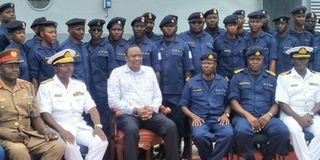Coast Guard launch a chance to revamp maritime security

President Uhuru Kenyatta with members of the Kenya Coast Guard Service during its launch at Liwatoni in Mombasa County, on November 19, 2018. PHOTO | LABAN WALLOGA | NATION MEDIA GROUP
What you need to know:
- Maritime security does not rank high enough in the priorities to attract adequate government funding and investment.
- In 2016, President Kenyatta created a State Department of Fisheries and Blue Economy.
I regard the launch on Monday of the Kenya Coast Guard Services by President Uhuru Kenyatta a good starting point to begin seriously thinking about maritime security.
The truth of the matter is that we have not had a coast guard to talk of for many years. Maritime security does not rank high enough in the priorities to attract adequate government funding and investment.
Until the other day, we did not even have the capacity to monitor the movement of all vessels on the coastline.
I was told this anecdote about how there was a time the American Government donated telecommunications gadgets that made it possible for the Kenya Maritime Authority (KMA) to spot all dhows and ships approaching our coastline, particularly undocumented vessels known to dock at clandestine corners.
MARITIME INDUSTRY
According a pal of mine who was a top state official in the maritime industry, the gadget had been surreptitiously mounted on a building within the port.
A multi-ministerial security team that had been convening weekly suddenly realised that KMA was regularly reporting on undocumented vessels.
Hardly a few months after that facility had been mounted, someone quietly removed the damn thing and threw it away never to be seen again.
What is my point in repeating this anecdote? The gadget had to be disabled because it was threatening to disrupt an equilibrium characterised by unregulated fishing, the smuggling of contraband goods and piracy. We must all wait to see how much of a game changer the Kenya Coast Guard Services will be?
POLITICAL SUPPORT
The department will need political support from the very top to make a difference because networks that thrive on contraband have proved to be very tenacious.
Indeed, it was not until the upsurge of piracy between 2008-2012 that we starting feeling the head and appreciating just how critical maritime security is to the economy.
The cost of marine insurance rose sharply, driving the cost of imported goods upwards, all this happening in the context of a worsening balance of payments situation. While the tourism industry, in general, suffered immensely, cruise tourism died.
CONFERENCE
Today, the new obsession within the government is what is called the blue economy. We will be hosting a major international conference soon.
In 2016, President Kenyatta created a State Department of Fisheries and Blue Economy. It was followed by a blue economy implementation committee. The President has an opportunity change the economy of the coast by directing sufficient resources to develop the blue economy.
Granted, major investment has been made in developing ports. The Standard Gauge Railway is an important investment. But public and private investment must now move from building overhead bridges, by-passes and buying new ferries, to developing a robust marine industry to create jobs and business opportunities for locals.
DEEP FISHING GEAR
What must we do to support the entry of locals into large-scale fishing? Today, we all know that tuna is available in plenty in Kenyan waters. But due to the lack of deep- fishing gear, our people are unable to take the plunge into it. Which begs the question: What type of fiscal incentive is capable of spurring substantial domestic capital into flowing in this direction?
We export billions of shillings in paying freight and local destination charges to foreign service providers, who bring in and take back the containers from our port.
Very little exits in terms of participation of local firms in the major shipping industry support and auxiliary services. There was a time Kenya container depot operators thrived in repairing, cleaning and storing empty containers. Most of the business has migrated to India and China.
LOCAL SUBSIDIARIES
What tax exemptions should we introduce to support the emergence and growth of existing repair facilities? In the past, Kenyan entrepreneurs dominated shipping agency services, inland transportation, ship contracting, security agencies and tallying services.
International players edged our people out by incorporating local subsidiaries. In 2009, the government enacted the Merchant Shipping Act, 2009, whose centrepiece was a local participation threshold in the maritime transport industry. The shipping firms went to court and got a ruling supporting their case.
CARGO IMPORTS
When you talk about local participation in maritime transportation today, you are treated as if you are preaching a heresy.
In 1999, the government introduced an amendment to the Insurance Act that required compulsory insurance of all the marine cargo imports by locally registered insurance companies. It did not work.
The blue economy must be about massive new investment and a fiscal regime with a wide-ranging fiscal incentive schemes.





